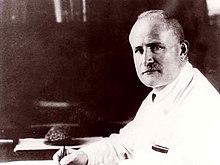Hans Berger | |
|---|---|
 | |
| Born | 21 May 1873 |
| Died | 1 June 1941 (aged 68) Jena, Germany |
| Alma mater | University of Jena |
| Known for | Electroencephalograms; discovery of the alpha wave rhythm |
| Spouse | Baroness Ursula von Bülow |
| Scientific career | |
| Fields | Psychiatry |
Hans Berger (21 May 1873 – 1 June 1941) was a German psychiatrist. He is best known as the inventor of electroencephalography (EEG) in 1924, which is a method used for recording the electrical activity of the brain, commonly described in terms of brainwaves, and as the discoverer of the alpha wave rhythm which is a type of brainwave.[1][2] Alpha waves have been eponymously referred to as the "Berger wave."[3]
- ^ Tudor, M.; Tudor, L.; Tudor, K. I. (2005). "Hans Berger (1873-1941)--the history of electroencephalography". Acta Medica Croatica. 59 (4): 307–13. PMID 16334737.
- ^ Berger's invention has been described "as one of the most surprising, remarkable, and momentous developments in the history of clinical neurology." David Millet (2002), "The Origins of EEG" International Society for the History of the Neurosciences (ISHN)
- ^ İnce, Rümeysa; Adanır, Saliha Seda; Sevmez, Fatma (2020-03-05). "The inventor of electroencephalography (EEG): Hans Berger (1873–1941)". Child's Nervous System. 37 (9): 2723–2724. doi:10.1007/s00381-020-04564-z. ISSN 1433-0350. PMID 32140776. S2CID 212405109.